Corporate Law Assignment: Avengers Ltd. Director's Responsibilities
VerifiedAdded on 2022/10/04
|6
|1030
|258
Report
AI Summary
This Corporate Law assignment analyzes a scenario involving Avengers Ltd., focusing on the duties and responsibilities of its directors, particularly the actions of Captin and Ironman. The assignment explores whether the director, Captin, breached his duty of care by failing to support Ironman's software development initiative. The analysis incorporates relevant sections of the Corporation Act 2001, common law principles, and the business judgment rule to determine the extent of Captin's negligence. The report also examines whether Ironman engaged in a breach of conflict of interest. The analysis follows the ILAC structure (Issue, Law, Application, Conclusion), providing a comprehensive understanding of director's obligations and potential liabilities in corporate governance.
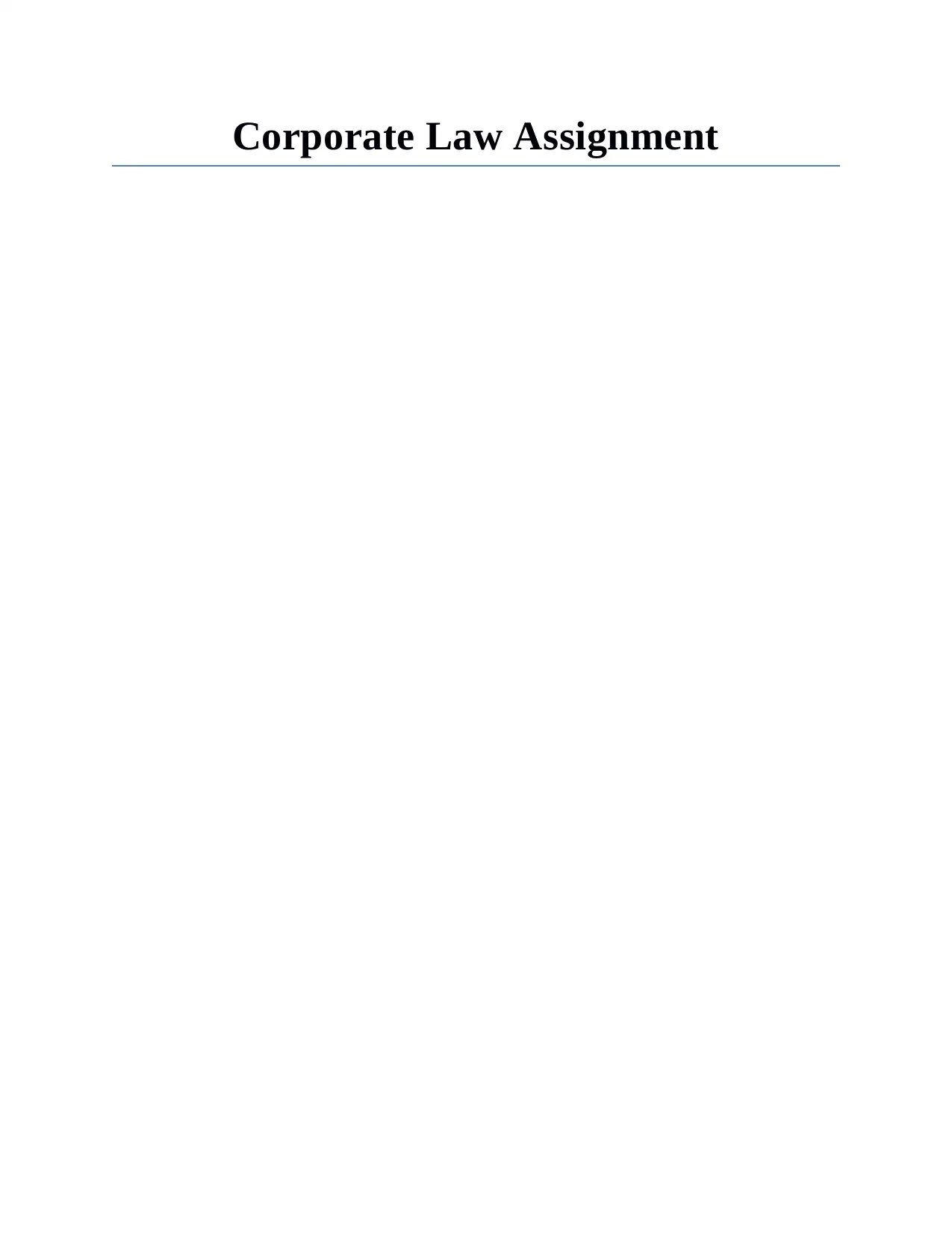
Corporate Law Assignment
Paraphrase This Document
Need a fresh take? Get an instant paraphrase of this document with our AI Paraphraser
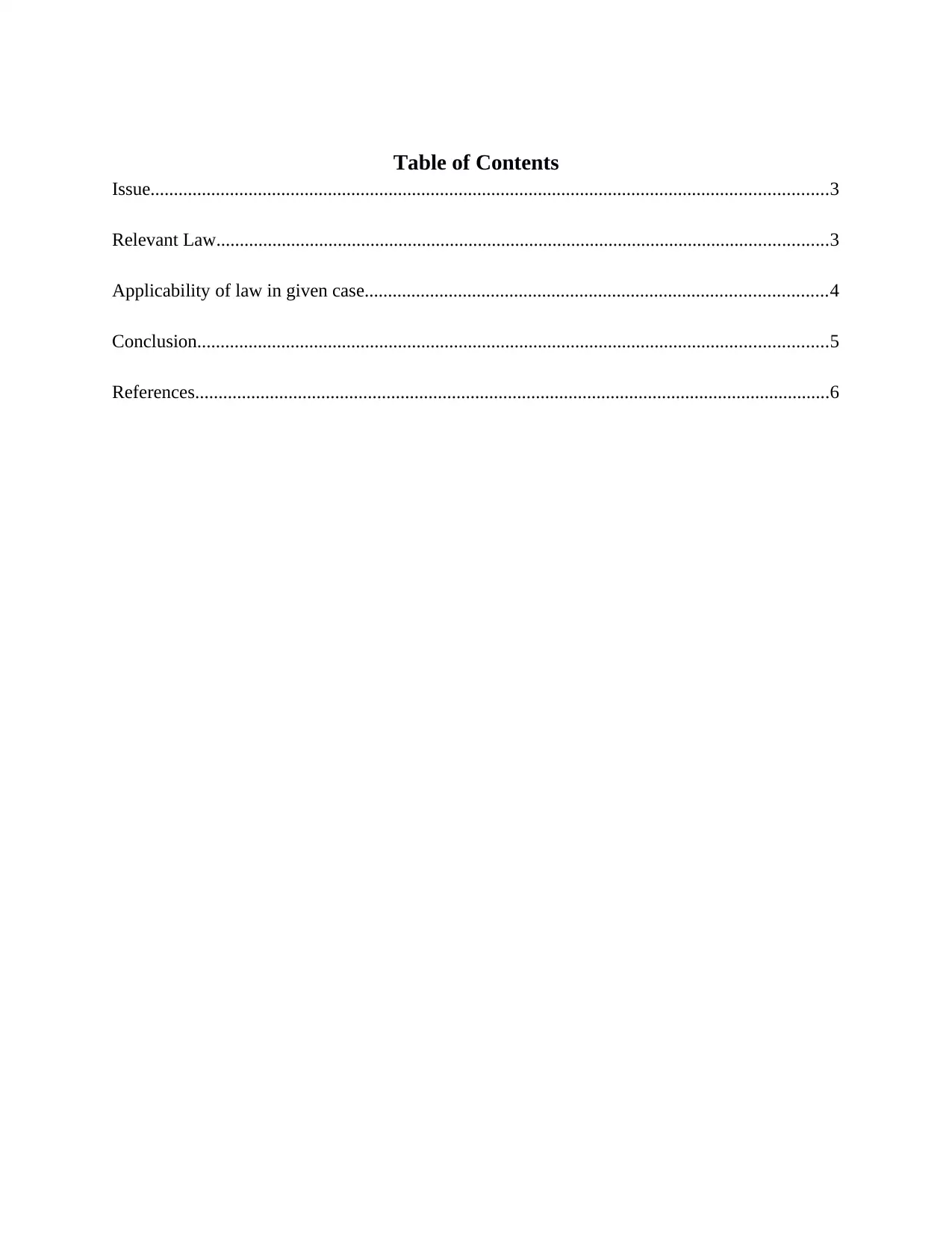
Table of Contents
Issue.................................................................................................................................................3
Relevant Law...................................................................................................................................3
Applicability of law in given case...................................................................................................4
Conclusion.......................................................................................................................................5
References........................................................................................................................................6
Issue.................................................................................................................................................3
Relevant Law...................................................................................................................................3
Applicability of law in given case...................................................................................................4
Conclusion.......................................................................................................................................5
References........................................................................................................................................6
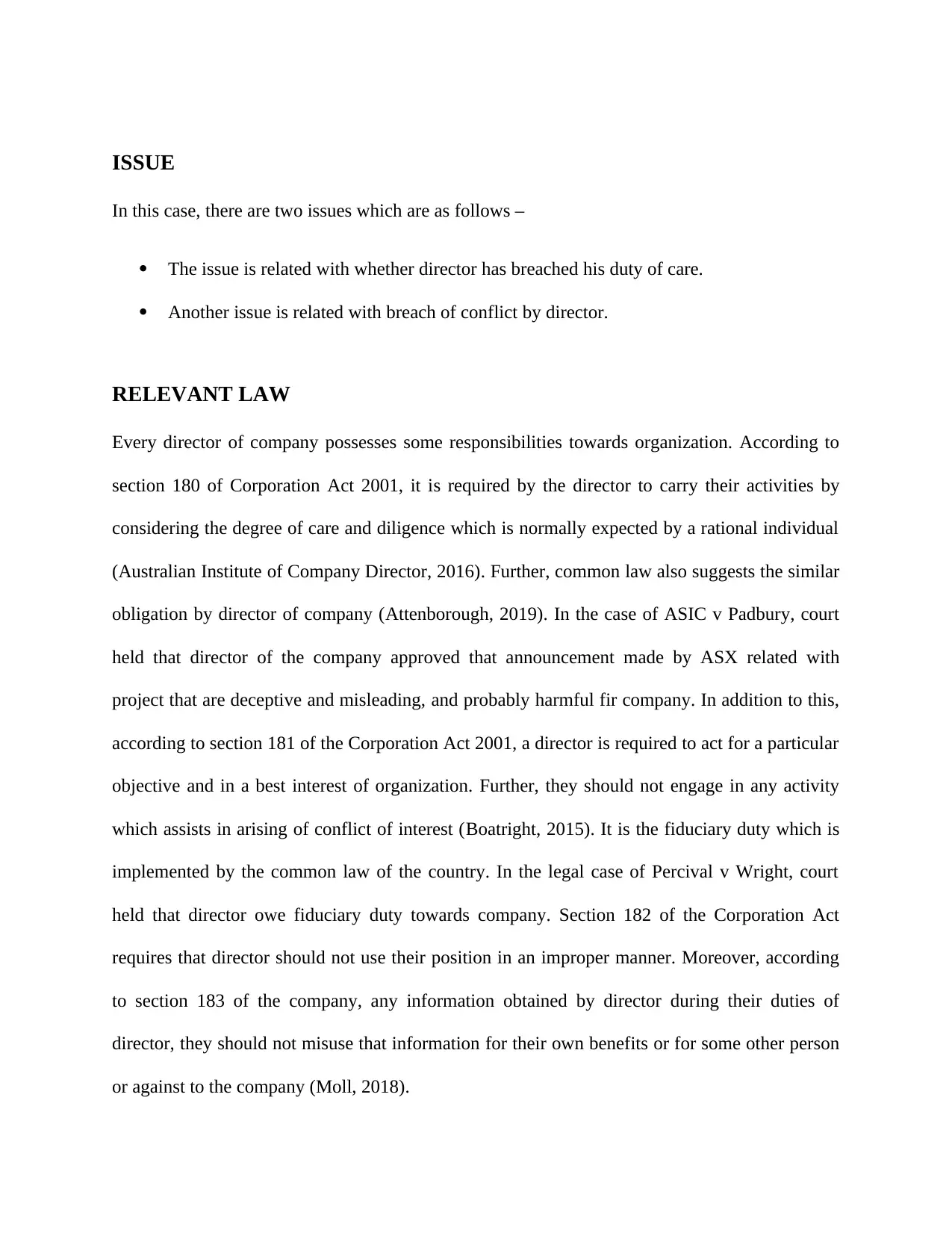
ISSUE
In this case, there are two issues which are as follows –
The issue is related with whether director has breached his duty of care.
Another issue is related with breach of conflict by director.
RELEVANT LAW
Every director of company possesses some responsibilities towards organization. According to
section 180 of Corporation Act 2001, it is required by the director to carry their activities by
considering the degree of care and diligence which is normally expected by a rational individual
(Australian Institute of Company Director, 2016). Further, common law also suggests the similar
obligation by director of company (Attenborough, 2019). In the case of ASIC v Padbury, court
held that director of the company approved that announcement made by ASX related with
project that are deceptive and misleading, and probably harmful fir company. In addition to this,
according to section 181 of the Corporation Act 2001, a director is required to act for a particular
objective and in a best interest of organization. Further, they should not engage in any activity
which assists in arising of conflict of interest (Boatright, 2015). It is the fiduciary duty which is
implemented by the common law of the country. In the legal case of Percival v Wright, court
held that director owe fiduciary duty towards company. Section 182 of the Corporation Act
requires that director should not use their position in an improper manner. Moreover, according
to section 183 of the company, any information obtained by director during their duties of
director, they should not misuse that information for their own benefits or for some other person
or against to the company (Moll, 2018).
In this case, there are two issues which are as follows –
The issue is related with whether director has breached his duty of care.
Another issue is related with breach of conflict by director.
RELEVANT LAW
Every director of company possesses some responsibilities towards organization. According to
section 180 of Corporation Act 2001, it is required by the director to carry their activities by
considering the degree of care and diligence which is normally expected by a rational individual
(Australian Institute of Company Director, 2016). Further, common law also suggests the similar
obligation by director of company (Attenborough, 2019). In the case of ASIC v Padbury, court
held that director of the company approved that announcement made by ASX related with
project that are deceptive and misleading, and probably harmful fir company. In addition to this,
according to section 181 of the Corporation Act 2001, a director is required to act for a particular
objective and in a best interest of organization. Further, they should not engage in any activity
which assists in arising of conflict of interest (Boatright, 2015). It is the fiduciary duty which is
implemented by the common law of the country. In the legal case of Percival v Wright, court
held that director owe fiduciary duty towards company. Section 182 of the Corporation Act
requires that director should not use their position in an improper manner. Moreover, according
to section 183 of the company, any information obtained by director during their duties of
director, they should not misuse that information for their own benefits or for some other person
or against to the company (Moll, 2018).
⊘ This is a preview!⊘
Do you want full access?
Subscribe today to unlock all pages.

Trusted by 1+ million students worldwide
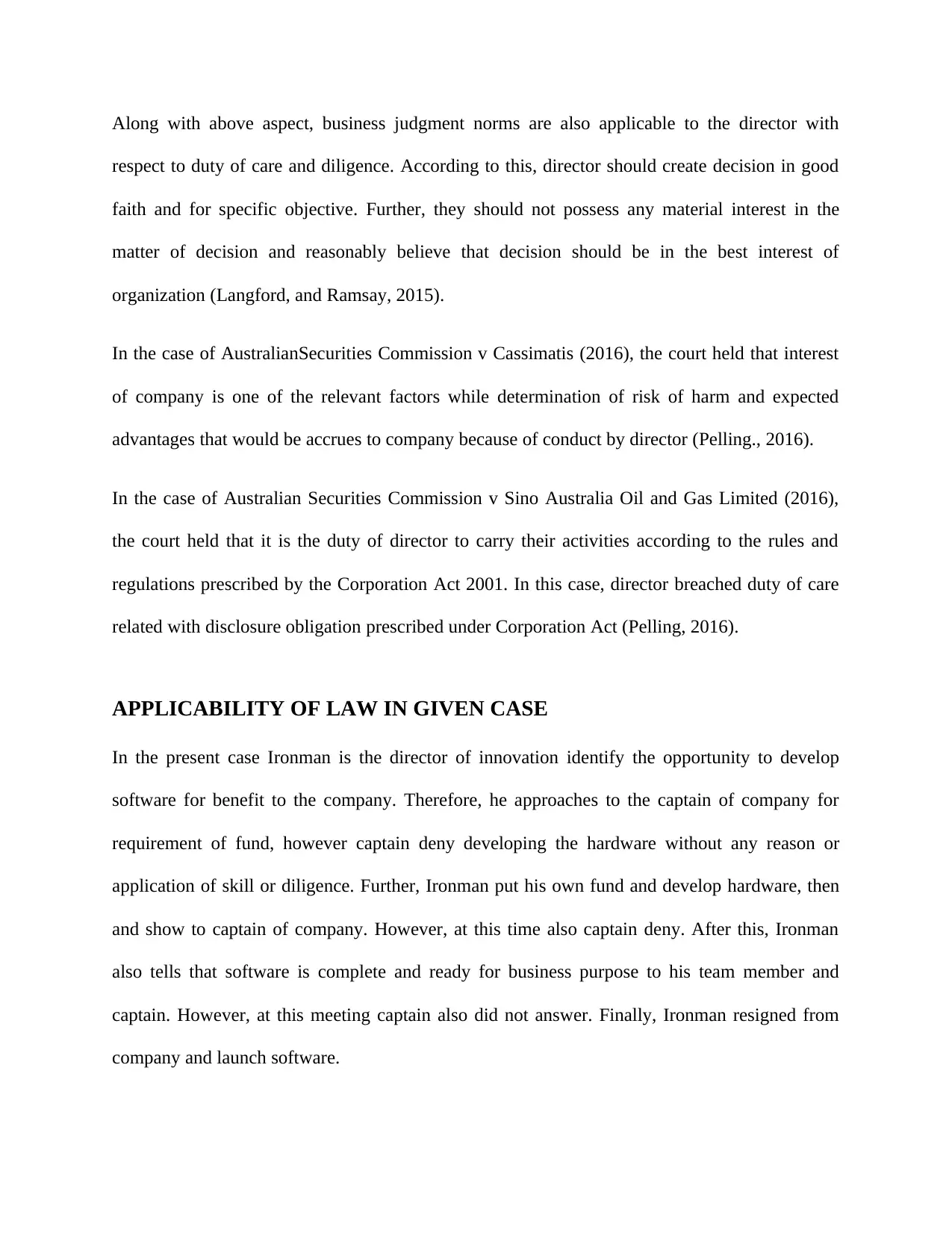
Along with above aspect, business judgment norms are also applicable to the director with
respect to duty of care and diligence. According to this, director should create decision in good
faith and for specific objective. Further, they should not possess any material interest in the
matter of decision and reasonably believe that decision should be in the best interest of
organization (Langford, and Ramsay, 2015).
In the case of AustralianSecurities Commission v Cassimatis (2016), the court held that interest
of company is one of the relevant factors while determination of risk of harm and expected
advantages that would be accrues to company because of conduct by director (Pelling., 2016).
In the case of Australian Securities Commission v Sino Australia Oil and Gas Limited (2016),
the court held that it is the duty of director to carry their activities according to the rules and
regulations prescribed by the Corporation Act 2001. In this case, director breached duty of care
related with disclosure obligation prescribed under Corporation Act (Pelling, 2016).
APPLICABILITY OF LAW IN GIVEN CASE
In the present case Ironman is the director of innovation identify the opportunity to develop
software for benefit to the company. Therefore, he approaches to the captain of company for
requirement of fund, however captain deny developing the hardware without any reason or
application of skill or diligence. Further, Ironman put his own fund and develop hardware, then
and show to captain of company. However, at this time also captain deny. After this, Ironman
also tells that software is complete and ready for business purpose to his team member and
captain. However, at this meeting captain also did not answer. Finally, Ironman resigned from
company and launch software.
respect to duty of care and diligence. According to this, director should create decision in good
faith and for specific objective. Further, they should not possess any material interest in the
matter of decision and reasonably believe that decision should be in the best interest of
organization (Langford, and Ramsay, 2015).
In the case of AustralianSecurities Commission v Cassimatis (2016), the court held that interest
of company is one of the relevant factors while determination of risk of harm and expected
advantages that would be accrues to company because of conduct by director (Pelling., 2016).
In the case of Australian Securities Commission v Sino Australia Oil and Gas Limited (2016),
the court held that it is the duty of director to carry their activities according to the rules and
regulations prescribed by the Corporation Act 2001. In this case, director breached duty of care
related with disclosure obligation prescribed under Corporation Act (Pelling, 2016).
APPLICABILITY OF LAW IN GIVEN CASE
In the present case Ironman is the director of innovation identify the opportunity to develop
software for benefit to the company. Therefore, he approaches to the captain of company for
requirement of fund, however captain deny developing the hardware without any reason or
application of skill or diligence. Further, Ironman put his own fund and develop hardware, then
and show to captain of company. However, at this time also captain deny. After this, Ironman
also tells that software is complete and ready for business purpose to his team member and
captain. However, at this meeting captain also did not answer. Finally, Ironman resigned from
company and launch software.
Paraphrase This Document
Need a fresh take? Get an instant paraphrase of this document with our AI Paraphraser
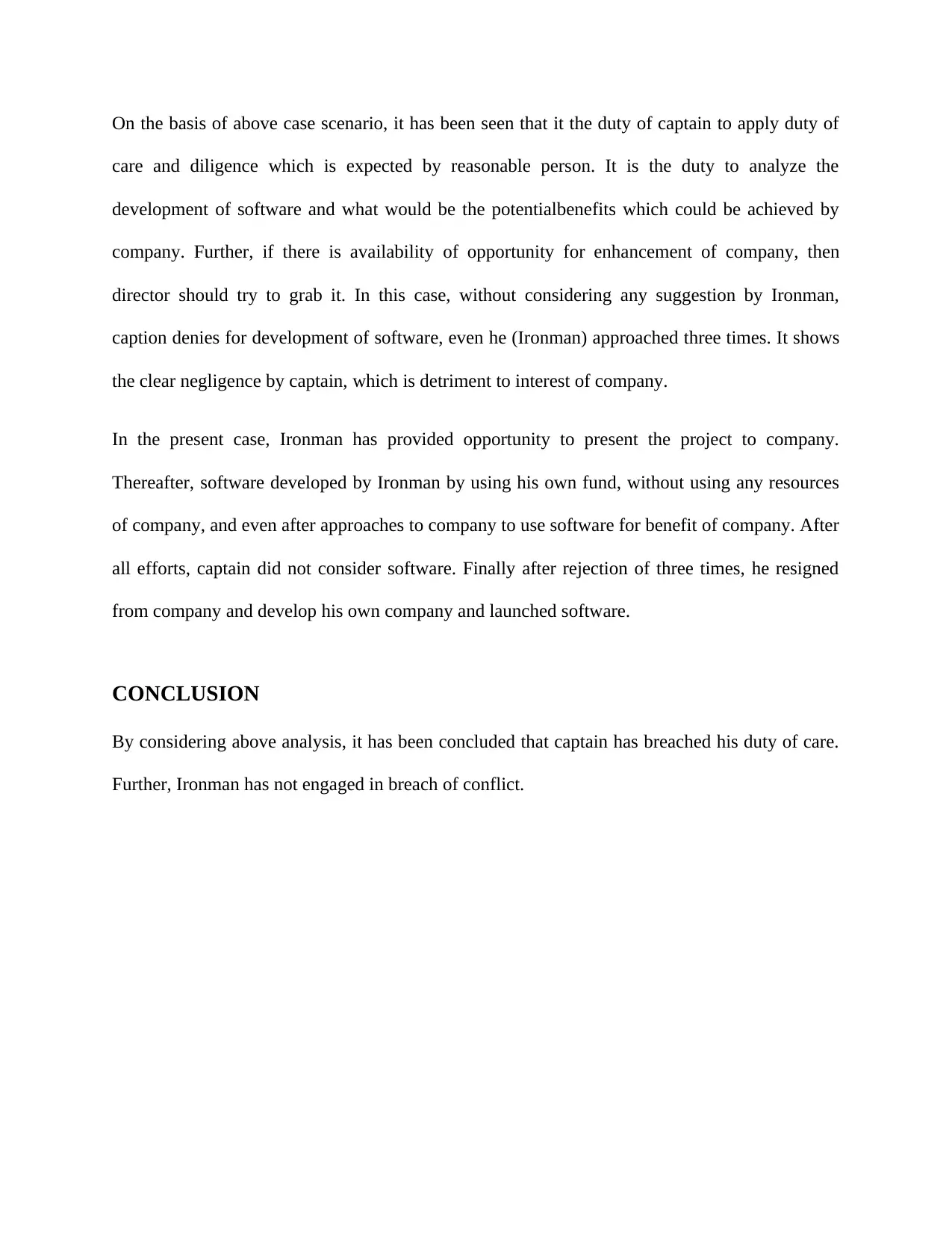
On the basis of above case scenario, it has been seen that it the duty of captain to apply duty of
care and diligence which is expected by reasonable person. It is the duty to analyze the
development of software and what would be the potentialbenefits which could be achieved by
company. Further, if there is availability of opportunity for enhancement of company, then
director should try to grab it. In this case, without considering any suggestion by Ironman,
caption denies for development of software, even he (Ironman) approached three times. It shows
the clear negligence by captain, which is detriment to interest of company.
In the present case, Ironman has provided opportunity to present the project to company.
Thereafter, software developed by Ironman by using his own fund, without using any resources
of company, and even after approaches to company to use software for benefit of company. After
all efforts, captain did not consider software. Finally after rejection of three times, he resigned
from company and develop his own company and launched software.
CONCLUSION
By considering above analysis, it has been concluded that captain has breached his duty of care.
Further, Ironman has not engaged in breach of conflict.
care and diligence which is expected by reasonable person. It is the duty to analyze the
development of software and what would be the potentialbenefits which could be achieved by
company. Further, if there is availability of opportunity for enhancement of company, then
director should try to grab it. In this case, without considering any suggestion by Ironman,
caption denies for development of software, even he (Ironman) approached three times. It shows
the clear negligence by captain, which is detriment to interest of company.
In the present case, Ironman has provided opportunity to present the project to company.
Thereafter, software developed by Ironman by using his own fund, without using any resources
of company, and even after approaches to company to use software for benefit of company. After
all efforts, captain did not consider software. Finally after rejection of three times, he resigned
from company and develop his own company and launched software.
CONCLUSION
By considering above analysis, it has been concluded that captain has breached his duty of care.
Further, Ironman has not engaged in breach of conflict.
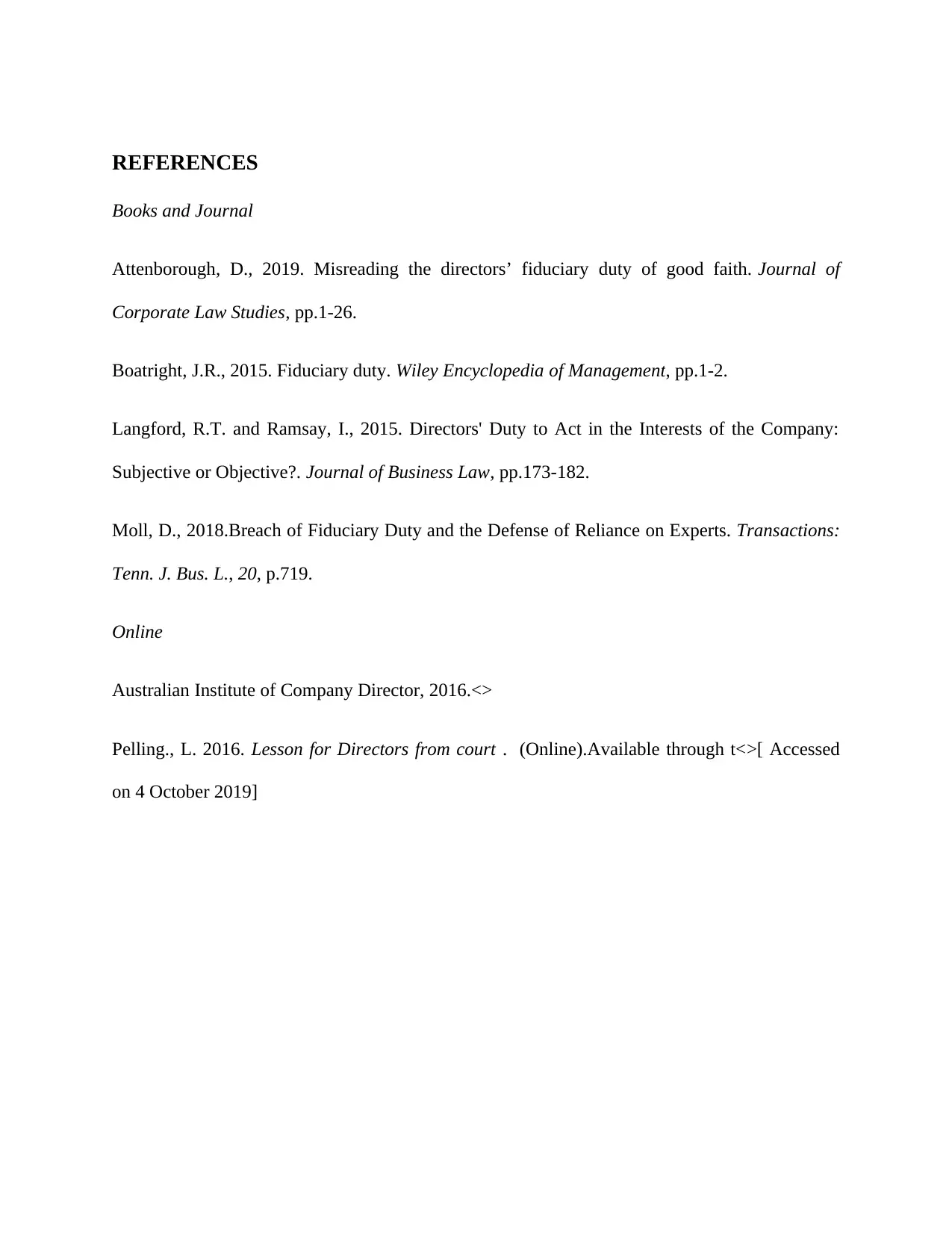
REFERENCES
Books and Journal
Attenborough, D., 2019. Misreading the directors’ fiduciary duty of good faith. Journal of
Corporate Law Studies, pp.1-26.
Boatright, J.R., 2015. Fiduciary duty. Wiley Encyclopedia of Management, pp.1-2.
Langford, R.T. and Ramsay, I., 2015. Directors' Duty to Act in the Interests of the Company:
Subjective or Objective?. Journal of Business Law, pp.173-182.
Moll, D., 2018.Breach of Fiduciary Duty and the Defense of Reliance on Experts. Transactions:
Tenn. J. Bus. L., 20, p.719.
Online
Australian Institute of Company Director, 2016.<>
Pelling., L. 2016. Lesson for Directors from court . (Online).Available through t<>[ Accessed
on 4 October 2019]
Books and Journal
Attenborough, D., 2019. Misreading the directors’ fiduciary duty of good faith. Journal of
Corporate Law Studies, pp.1-26.
Boatright, J.R., 2015. Fiduciary duty. Wiley Encyclopedia of Management, pp.1-2.
Langford, R.T. and Ramsay, I., 2015. Directors' Duty to Act in the Interests of the Company:
Subjective or Objective?. Journal of Business Law, pp.173-182.
Moll, D., 2018.Breach of Fiduciary Duty and the Defense of Reliance on Experts. Transactions:
Tenn. J. Bus. L., 20, p.719.
Online
Australian Institute of Company Director, 2016.<>
Pelling., L. 2016. Lesson for Directors from court . (Online).Available through t<>[ Accessed
on 4 October 2019]
⊘ This is a preview!⊘
Do you want full access?
Subscribe today to unlock all pages.

Trusted by 1+ million students worldwide
1 out of 6
Related Documents
Your All-in-One AI-Powered Toolkit for Academic Success.
+13062052269
info@desklib.com
Available 24*7 on WhatsApp / Email
![[object Object]](/_next/static/media/star-bottom.7253800d.svg)
Unlock your academic potential
Copyright © 2020–2026 A2Z Services. All Rights Reserved. Developed and managed by ZUCOL.





